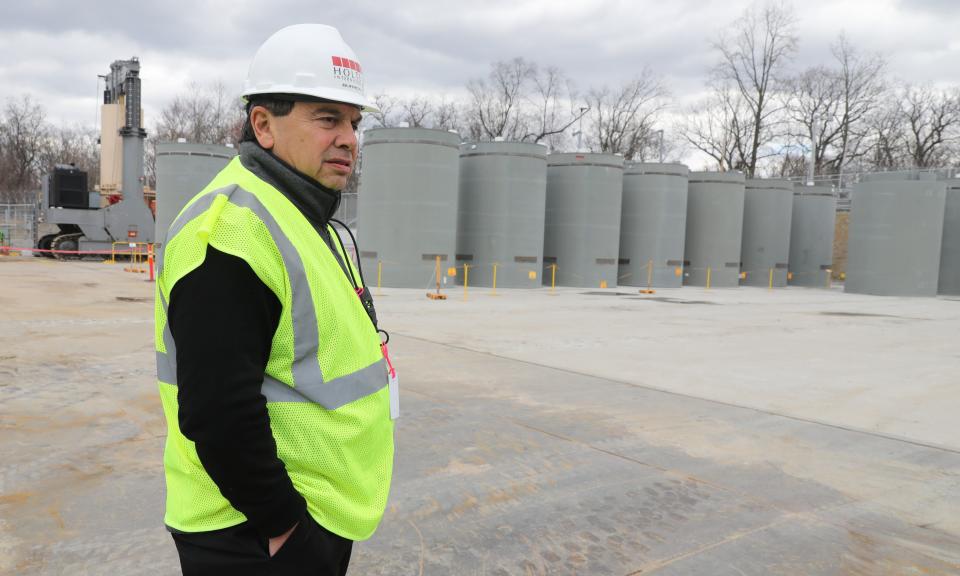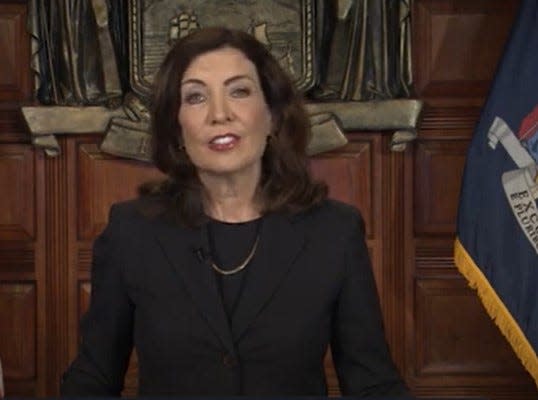Hochul inks Indian Point bill but radiological waste debate rages on
- Oops!Something went wrong.Please try again later.
- Oops!Something went wrong.Please try again later.
The owners of the shuttered Indian Point nuclear power plant were planning to dump a million gallons of radiological water into the Hudson River and state Sen. Pete Harckham wasn’t about to let that happen.
In February, Harckham introduced a bill – S5181 – that established fines for any person or business caught releasing radiological agents into state waterways.
“Exposure to toxic substances and radioactive material poses not only a possible health risk, but also a serious economic risk to our communities with potential negative impacts on real estate values,” the bill stated.
Harckham’s bill, as well as an identical version in the Assembly sponsored by fellow Democrat Dana Levenberg, never made it out of committee.
Months later, with towns along the river issuing resolutions opposing the discharge, Harckham introduced a second bill – S6983 – prohibiting the discharge of radiological substances into the Hudson. It was fine-tuned to only include discharges made during the decommissioning of a nuclear power plant, a tweak that put Indian Point’s owner – New Jersey-based Holtec International – on notice.

Hospitals that release radioactive substances used during the treatment of cancer patients into the Hudson through wastewater treatment plants were not mentioned.
And absent was any mention of other state waterways that might be impacted or the “possible health risk” included in the first bill.
On Aug. 18, Gov. Kathy Hochul signed the bill into law.
“The Hudson River is one of New York’s landmark natural treasures, and it’s critical we stand together to protect it for generations to come,” Hochul’s statement said.
It never mentioned possible health risks.
Harckham called it “one of the great environmental victories in state history.”

Ban: Hochul bans Indian Point parent company from releasing radioactive water into Hudson
Is it dangerous?
But the signing leaves unresolved a question on the minds of those who fish the river or rely on it for their drinking water. Would the release pose a danger to public health?
In the past year, the question sparked a vigorous debate pitting radiation scientists against environmentalists who say any pollution by a radiological substance that’s been linked to cancer should be avoided.
Radiation experts question such an approach.
They agree with the decision by the Nuclear Regulatory Commission, which approved Holtec’s plan saying the amounts of radioactive material to be released are below acceptable levels established by the U.S. Environmental Protection Agency.

The substance that has raised the most concern – tritium – naturally occurs during cosmic interactions in the atmosphere and naturally occurring radioactive materials, according to Nolan Hertel, the past president of the Health Physics Society, radiation scientists who educate the public on the topic.
“What they would dump under NRC regulations would just be a small fraction of what you and I get in the normal course of a year from naturally occurring radioactive materials around us,” said Hertel, who retired in June after 44 years as a professor in nuclear and radiological engineering at Georgia Tech.
And, Hertel notes, when the radioactive water is released into the Hudson – an estuary that flows into the ocean – it would be diluted over and over again.
“If my grandchildren lived a couple of miles down the river from it I wouldn’t worry at all looking at the numbers I’ve seen,” he added.
Environmental groups would.
On Aug. 23, dozens of organizations sent a letter to Hochul urging the state to assess decades of radioactive water discharges from Indian Point by matching it against a baseline study done by the state Department of Health of the area near the plant in 1958.
“It’s time to look at what has been the cumulative impact, if any, pollution both radioactive and toxic, of that 20-mile radius,” said Anne Rabe, the environmental policy director of the New York Public Interest Research Group.
Rabe said studies have shown that people who eat fish from water contaminated by radioactive agents could be harmed.
“It’s a carcinogen,” Rabe said. “There’s no safe level with a carcinogen.”
Layoffs?: Indian Point shutdown was supposed to quiet anti-nuclear critics. Not a chance
Debate at state hearings
The debate played out at decommissioning oversight hearings the state held in the Hudson Valley over the past year.
Among those testifying was David Lochbaum, an independent expert hired by the state who worked in the nuclear industry before heading the Nuclear Safety Project for the Union of Concerned Scientists.
Lochbaum says releasing the water into the river would be safer than keeping it stored in tanks on the 240-acre site in Buchanan.
“If you truly believe that low levels of tritium can cause cancer then storing it on site will kill more people, because tritium evaporates, water evaporates,” Lochbaum said. “You have to have tanks vented otherwise they’ll collapse or implode.”
Lochbaum said his research into past decommissioning efforts in Canada and Vermont demonstrated the possibility of leaking storage tanks.
“If nothing ever leaks out or vents out it’s a better solution but it seems like too high a gamble,” Lochbaum says.
That’s a gamble Buchanan Mayor Theresa Knickerbocker would rather not take.
In an Aug. 18 letter to Hochul, Knickerbocker cited Lochbaum’s findings in urging the governor not to sign the bill.
“The anti-nuclear groups have not presented any facts or data contrary to the experts,” Knickerbocker wrote. “They have been effective in fearmongering and misinformation.”
The letter highlighted the village's frustration with environmental groups like Riverkeeper who have pushed for the wastewater to remain on site. Knickerbocker fears such an outcome would hinder the village’s ability to redevelop parts of the site and begin recouping the millions of dollars in property taxes that were lost when the plant shut down in 2021.
“Once again what I call the Nuclear Boogeyman has appeared,” Knickerbocker writes.
Bill: Indian Point owner could face fines if it dumps radioactive water into Hudson
Holtec's plans on hold
Holtec's plan to begin discharging wastewater in batches of 18,000 gallons next month is on hold. Top executives note that the 2021 shutdown agreement entered into with the state and Riverkeeper authorized the discharge of wastewater, a claim Riverkeeper disputes.
The company says if it can’t remove the wastewater from pools used to cool spent fuel, the 10-to 12-year timetable for demolishing the plant will be delayed.
“We firmly believe that this legislation is preempted by federal law and that the discharge of monitored, processed, and treated water would not impact the environment or the health and safety of the public based upon years of scientific research,” spokesman Patrick O’Brien said.
A Hochul spokeswoman referred questions on the bill to Harckham and Levenberg.
Harckham said the final version of the bill addressed concerns that hospitals would be prohibited from releasing radiological waste into the river.
And he said it was drafted to withstand legal challenges by focusing on New York’s right to protect the economic well-being of communities along the river, where real estate values could be impacted by the release.
He cited a 1983 U.S. Supreme Court decision in a California case that said a state law placing a moratorium on building nuclear power plants was not preempted by federal law. The NRC regulates discharges from nuclear power plants across the country.
“We spent billions of dollars and decades cleaning up the Hudson River,” Harckham said. “And what’s happened? Countless municipalities have pegged their economic resurgence on their proximity to the river. “
He said the perception of danger to the public and the marketplace matters.
“We were told for years that PFAS (chemicals found in drinking water) was safe,” he said. “We were told the air at Ground Zero was safe. What people are saying throughout this process, and why 400,000 people signed a petition, was no amount of pollution is acceptable.”
This article originally appeared on Rockland/Westchester Journal News: Bill prohibiting Hudson nuclear waste discharge signed, debate goes on

